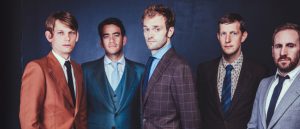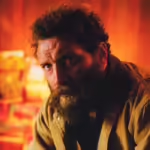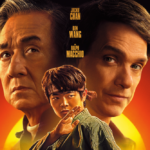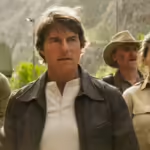The Punch Brothers, one of America’s most celebrated ‘bluegrass’ bands, are heading to Australia. We’ve put the commas around ‘bluegrass’ because the band are so much more than that. ‘American country-classical-chamber-music’ is one description that goes some way towards summing them up. The great T-Bone Burnett adores them so much he produced their current album The Phosphorescent Blues and called them ‘one of the most incredible bands America has produced’. Steve Martin is a huge fan, and the group are known in a whole other dimension for having their music in the Hunger Games. The band are making their first trip to Brisbane. Sean Sennett recently caught up with banjo player/steel guitarist Noam Pikenly.
The Phosphorescent Blues is about a year old in terms of being released. How long did it take you guys to record it?
As far as actual recording, Ihe whole band was in the studio for maybe two-and-a-half weeks, and then it was probably another month and a half of layering, mixing, and editing. It was all and all probably a two-and-a-half-month process, but we weren’t all in the studio for every single day of that.
We recorded in Los Angeles with T Bone Burnett and we did some satellite recording in Nashville because of peoples’ schedules. The record was really two years in the making, in that we decided we wanted to change our approach to the preparation for the record.
Previously, we had all been living in the same town. We’d been living in New York and would just try to steal moments here and there, while everyone was in town to write the music. In preparation for The Phosphorescent Blues, we were a bit more scattered. Gabe had moved back to Los Angeles, and I was on my way out of New York eventually to make it in Nashville.
We decided we were going to schedule writing retreats. We would pick a destination, whether it was Charleston, South Carolina, or Telluride, Colorado or Charlottesville, Virginia, where we book one show or do a festival and then stay for a week, where we’d just be disconnected from the normal everyday stuff that can sometimes interrupt the workflow when you’re in your own hometown.
We have these retreats where we rent a house and cook for ourselves, stay up late listening to music and talking about music. We did that over about a year and a half before we went into the studio to record.
We kind of created a new way of preparing. I’m hoping that’s how we continue to do it because it was really a fun way to work on the music. Get somewhere off the beaten path, and everyone bringing a lot of ideas, and we bounce ideas off each other, and started getting to work. It was a really productive retreat.
I’m wondering when T Bone Burnett got involved. Was he involved as early as that or did you present him your demos when you had them?
T Bone wasn’t involved on the writing retreats that spanned about a year before we went into the studio. I think there was always a sense once the ball started getting rolling on the music that T Bone was going to be the producer. I think we had that in mind as we were working on material, and conceptualizing what the recording approach would be.
He wasn’t there at the writing retreats, but once we started in Los Angeles he was there for all of it. We developed a rapport with him because we’d collaborated on several different projects over the last few years. We did something with him for the Hunger Games movies and then on the Chieftains record. Most substantially we did a lot of work with him through the music on the movie called Inside Llewyn Davis.
We’ve done all these projects with him which were really fun and rewarding but nothing long form. I think we were all itching to get to collaborate where it wasn’t just a song or a soundtrack. All roads were leading towards that collaboration for several years. It was a really joyous experience recording with T Bone. I think he really keeps everybody focused on the fact we’re doing this as an act of humanity and community. This is something we’re doing for the joy of creating something together.
He keeps the sessions really purposeful in the sense we’re just trying to enable people to do their best and to create an environment where people don’t get in their own way, where people don’t start stressing out because they’re all of a sudden in the studio, or psychoanalysing because it’s more permanent.
It’s interesting that most musicians spend 95% of their lives playing in front of audiences and playing on stage. That’s like falling off a log. It’s the most natural thing in the world, but when you’re given the task of making a record, the thing that’s the most permanent, you find yourself in an environment that you’ve only spent 5% of your musical life.
The number of hours you spend on stage completely drowns out the number of hours one spent in the studio, unless they’re a studio musician or a session rat, someone who does that all the time. So I think it’s really key to have an environment where you really feel you’re just performing. You just need to be performing in the studio in the same way you perform live. I think that’s why having someone like T Bone is really important.
One, he makes sure that’s kept consistent. And he’s an excellent audience to be playing for. He’s listening for all the right reasons and with a perspective that I think could be described as encyclopaedic knowledge of American music or folk music, and popular music.
He’s able to draw references, such a spectrum of references that he’s pulling from. I really feel when he comes in he’s able to make a metaphor. He’s drawing from a very deep well. I feel like that really affects the mood and the results, ultimately.
The Wireless EP, what was the motivation behind that? Is it a linking piece back to the album?
We’ve always tried to overcut – in the sense we’re going to go into the studio with more material than could possibly make it onto a record. Then it gives you a luxury to fine tune the sequence after the fact. It’s never a good thing to finish a record and think oh, if we just had one more thing like this we’d really be in good shape. Much better to finish and have the sense that well, this is all good, but something’s not going to be able to make it. A lot of times what ends up on the cutting room floor is just due to the sequencing and the nature of creating an arc across the course of the record. What doesn’t make it on the record isn’t necessarily B material or subpar, it just didn’t fit the sequence.
We’ve done it with the last few records, what didn’t make it onto the full-length album we would eventually release as an EP. That’s that The Wireless is. Some of those songs on The Wireless have been staples in our set for years, almost indispensable as far as our set list on a live show, but they didn’t necessarily make it onto the record. So it’s now fun to have a version of that, that’s out there that people can take home or listen to on their own schedule.
Is Steve Martin part of your squad?
I don’t know if I have a squad (laughs). I wish I had a banjo squad. I would like to have Steve Martin as part of my squad, especially if he had a really fast car with sirens and lights that I could just shove at him at any moment to come to my rescue. We’ve met through the music. He’s been a tremendous ally for Punch Brothers, and for me as far as my solo career. He’s just about the most inspiring person I’ve ever gotten to spend time with.
He’s so good at everything that he does. He has such wide-ranging interests. He’s a guy that just can’t be fascinated by something on the surface. He wants to take it apart and understand it and try his own hand at it. I think he’s been somebody who really he’s inspired me to keep doing what I’m doing. And especially with the solo thing, he’s just been a huge champion for Punch Brothers and acoustic bluegrass music at large within the world. I’m really grateful to that guy.
I’m looking forward to the show. I guess you’ll be playing a whole range of things from across the years?
Yeah. We’ll be focusing primarily on the Phosphorescent Blues and stuff from The Wireless. We always kind of the most current record is usually the focal point, but in a 90-minute-plus show, we have lots of time to help surround it with music from our previous records. We love playing, whether it’s traditional bluegrass or from a band like The Strokes. It’ll be a big mix.
Punch Brother play the Concert Hall QPAC on August 9 (7.30pm)




